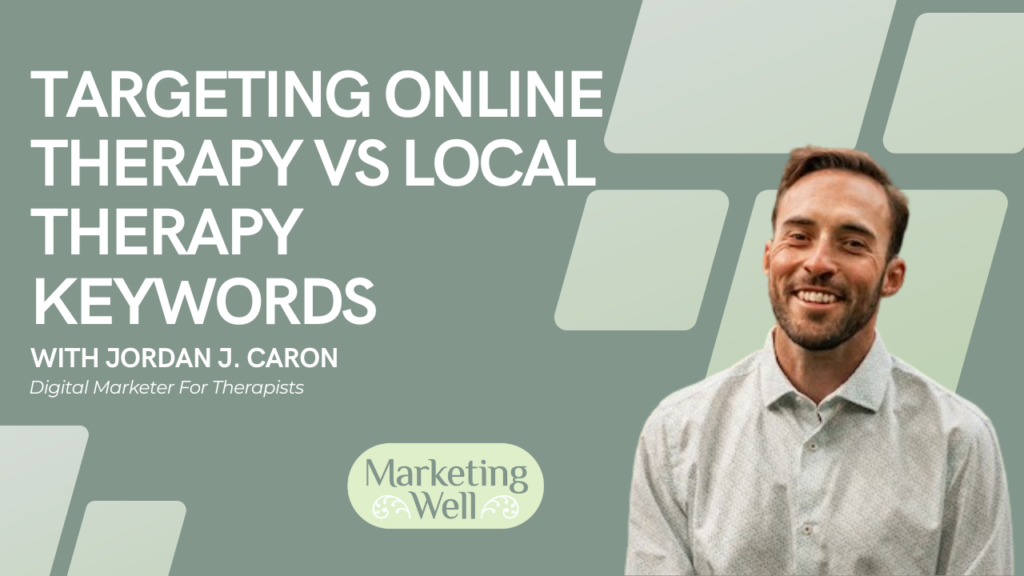In today’s post, I’d like to delve into the nuances of targeting keywords for online therapy versus attracting clients seeking local in-office therapy sessions. This distinction is critical for therapists who want to focus on a broader virtual audience or prioritize nearby clients.
Targeting Online Therapy vs. Local Counselling Keywords
Therapists frequently ask me about how to promote their services online. Many are drawn to offering virtual-only therapy due to its flexibility and lower overhead costs—no office space required. But while this might seem like an easier route, the truth is that competing for visibility in the online therapy space, primarily through search engine optimization (SEO) and Google Ads, is far more challenging than targeting local clientele.
The Competitive Landscape of Online Therapy Keywords
From an SEO for therapists perspective, ranking for “online therapy” is highly competitive. A quick Google search for this phrase brings up top-tier platforms like Psychology Today, BetterHelp, Talkspace, and other well-established conglomerates. Smaller private practices rarely appear in the first 30 search results, if at all. Most practices that attempt to rank for online therapy keywords often find themselves buried deep in the search results.
The difficulty arises because, unlike local practices, you’re more than competing against a handful of therapists in your area. You’re contending with massive companies that dominate the online space. As a result, ranking well for these terms is considerably more challenging, making investing in SEO for online therapy keywords a waste of time and money.
SEO for Local Therapy Practices
However, the SEO landscape is far more forgiving if you’re targeting local clients. Keywords such as “therapy [your city name]” are less competitive, making appearing in search results more accessible and driving traffic to your site. Just be sure you are focusing on SEO factors like optimizing page titles and crafting webpages for mental health issues.
Google Ads: A More Immediate Solution
Regarding Google Ads for therapists, the competition is similarly fierce for online therapy. While SEO is most likely not feasible, ads provide more immediate visibility. However, the cost per click (CPC) for online therapy-related keywords is significantly higher. For example, targeting “online therapy” may cost around $10 per click in Victoria, BC, while targeting local keywords like “therapy Victoria BC” might only cost $4 to $5 per click. This difference is substantial, especially considering the long-term budget required to maintain these ads.
Understanding Google Ads Pricing
Google Ads operates on a pay-per-click (PPC) model, meaning that you are charged a fee each time someone clicks on your ad. For highly competitive terms like “online therapy,” the cost can escalate quickly. Experienced advertisers know how to manage these campaigns efficiently, but even so, targeting online therapy is almost always more expensive than targeting local therapy.
For example, a keyword like “couples therapy Victoria BC” might cost $5 per click, while “online couples therapy” could easily double to $10 per click. This sharp increase is driven by higher competition from local therapists and large therapy networks. As a result, therapists targeting virtual sessions must be prepared for a larger marketing budget, given that every click represents a more significant investment.
Google Ads has a special offer on right now if you are interested.
Balancing Overhead and Competition
The allure of offering online-only sessions is understandable—no physical office means reduced costs. Yet, the high CPC for virtual therapy keywords can offset these savings. If you’re planning to market your services solely online, weighing the benefits of a broader audience against the potential for increased competition and higher advertising costs is essential.
Therapists who run in-person and online sessions may benefit from creating separate web pages for each service. While ranking for local therapy keywords is easier, ensuring that your practice also appears when potential clients search for online therapy could be beneficial, albeit more challenging and expensive.
Conclusion
Focusing on online therapy or local in-person sessions hinges on your marketing goals and budget. While online therapy offers access to a broader market, it also requires a more substantial investment to achieve visibility in search results and through ads. Conversely, targeting local clients through SEO and Google Ads is often less expensive and competitive, making it a viable option for therapists who want to balance growth with manageable overhead.
If you’re starting as a therapist, it may be worth focusing on your local area before branching out into the more competitive world of online therapy. This strategy can help you establish a client base without the high marketing costs of virtual therapy keywords.
By understanding the competitive landscape through SEO or Google Ads, therapists can make informed decisions on where to allocate their marketing efforts for the best return on investment.




